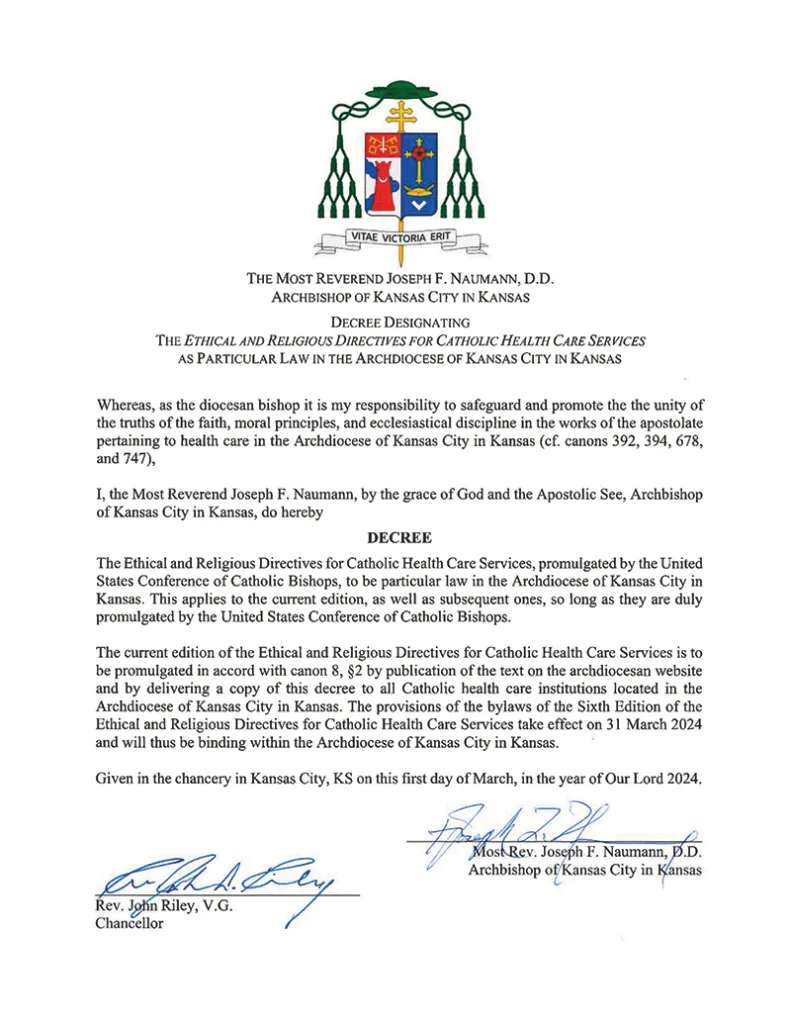
by Joe Bollig
joe.bollig@theleaven.org
KANSAS CITY, Kan. — Catholic medical professionals want to know where they can they go for reliable guidance for the moral and ethical questions they encounter, said Matt Kemnitz.
They just don’t always know where to look.
Kemnitz, chief mission officer at Catholic Community Health in Olathe and member of the Archdiocese of Kansas City in Kansas Ethics Council, knows where to look.
He consults a publication called “Ethical and Religious Directives for Catholic Health Care Services,” produced by the U.S. Conference of Catholic Bishops.
“When I give end-of-Mass talks [to Catholic medical professionals] about Catholic medical care, I hold up this booklet and ask, ‘How many of you know that this document exists?’” he said. “Nobody does. It’s something every Catholic should know, but not every Catholic does know it exists.”
Unless they’ve been part of the Catholic Medical Association, for example, they may have never heard of the Ethical and Religious Directives — ERDs.
“They come up to me and say, ‘Where do I get a copy of that? I’ve never heard of it,’” said Kemnitz.
The ERDs will become better known in the Archdiocese of Kansas City in Kansas thanks to a decree by Archbishop Joseph F. Naumann making the ERDs particular law in the archdiocese. The archbishop announced the decree on March 1.

Particular law is a law for a specific place or group of people in a specific diocese, province or nation.
The Ethical and Religious Directives are nothing new, said professor John Rziha, a member of the Benedictine College, Atchison, department of theology and also an archdiocesan ethics council member. The current sixth edition of the ERDs was published in 2018.
During a meeting with the U.S. bishops, members of the National Catholic Bioethics Center urged them to take the ERDs, which are advisory, and make them official law in their dioceses.
In the decree, Archbishop Naumann said that “as the diocesan bishop, it is my responsibility to safeguard and promote the unity of the truths of the faith, moral principles and ecclesiastical discipline in the works of the apostolate pertaining to health care in the Archdiocese of Kansas City in Kansas.”
Why are bishops making the ERDs particular law in their dioceses?
“As medical ethics issues are increasingly in the church’s face, if you will, and on the front page of our culture, I think it’s an opportunity for the church to take the Gospel to the peripheries,” said Father Luke Doyle, associate pastor at St. Michael the Archangel Parish in Leawood and member of the ethics council.
The ERDs are relevant not only for Catholic doctors, nurses and other medical professionals, but also all Catholics.
“This is the bishops of the United States’ guiding document that illustrates what Catholic health care delivered anywhere in the [country] ought to look like,” said Father Doyle.
“It should be seen as binding for Catholic institutions,” he continued, “but it certainly should also be seen as relevant information for any Catholic or person of good will who works in a health care institution.”
Catholic medical professionals have a moral responsibility to be well- formed in delivering health care in a manner that is consistent with the teachings of the Catholic Church, and this is the document that illustrates what that looks like, he said.
For a PDF of the “Ethical and Religious Directives for Catholic Health Care: Sixth Edition,” click here.






